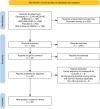Family planning behaviours among women with diabetes mellitus: a scoping review
- PMID: 38212858
- PMCID: PMC10782608
- DOI: 10.1186/s40001-023-01626-1
Family planning behaviours among women with diabetes mellitus: a scoping review
Abstract
Introduction: Diabetes mellitus in pregnancies is associated with adverse outcomes both for the mothers and babies. Postponing pregnancy in unoptimized conditions and stabilisation of glucose should be prioritized. This scoping review is aimed to determine the scope and at the same time map the types of evidence available that is related to family planning behaviours among women with diabetes mellitus, with a particular focus on their factors which influence family planning usage and subsequently enable the identification of knowledge gaps in preventing unintended pregnancies among this high-risk population.
Methods: This scoping review is guided by the methodological framework by Arksey and O'Malley's and Prisma-ScR checklist. PubMed, EBSCO and OVID were searched for empirical studies between 2000 and February 2022 using the search terms "family planning", "contraceptive" and "diabetes mellitus". Data were summarized according to the study characteristics and levels of factors influencing family planning behaviours.
Results: Thirty-five articles that met the eligibility criteria included 33 quantitative studies, one qualitative study and one mixed-methods study. The prevalence of family planning methods used by women with diabetes mellitus varied ranging from 4.8 to 89.8% among the studied population. Women with diabetes mellitus were reported to be less likely to utilise any family planning methods compared to women without diabetes mellitus.
Conclusions: Most of the evidence to date on family planning behaviours among women with diabetes mellitus focuses on the role of individual level sociodemographic factors. Few studies focused on exploring determinants at multiple levels. In this review we found that there is limited evidence on disease control and pregnancy intention in relation to their family planning practices. Future studies with more clinical and contextual factors are needed to guide the strengthening of family planning services for high-risk group women specifically for women with diabetes mellitus.
Keywords: Contraception; Diabetes mellitus; Family planning; Preconception care.
© 2024. The Author(s).
Conflict of interest statement
The authors declare they have no competing interests.
Similar articles
-
Beyond individual-level factors that influence family planning uptake among women with diabetes mellitus: a systematic literature review.BMC Public Health. 2025 Jan 24;25(1):317. doi: 10.1186/s12889-024-20784-3. BMC Public Health. 2025. PMID: 39856579 Free PMC article.
-
Women in larger bodies' experiences with contraception: a scoping review.Reprod Health. 2021 Apr 29;18(1):89. doi: 10.1186/s12978-021-01139-2. Reprod Health. 2021. PMID: 33926501 Free PMC article.
-
Reproductive care in Thai women with diabetes mellitus: a descriptive cross-sectional study.Reprod Health. 2023 Oct 12;20(1):152. doi: 10.1186/s12978-023-01694-w. Reprod Health. 2023. PMID: 37828526 Free PMC article.
-
Beyond knowledge acquisition: factors influencing family planning utilization among women in conservative communities in Rural Burundi.Reprod Health. 2021 May 13;18(1):94. doi: 10.1186/s12978-021-01150-7. Reprod Health. 2021. PMID: 33985538 Free PMC article.
-
Canadian Contraception Consensus (Part 2 of 4).J Obstet Gynaecol Can. 2015 Nov;37(11):1033-9. doi: 10.1016/s1701-2163(16)30054-8. J Obstet Gynaecol Can. 2015. PMID: 26629725 English, French.
Cited by
-
Factors associated with the intention to practise family planning among antenatal women with risk of gestational diabetes mellitus in Klang Health District: A cross-sectional study.Malays Fam Physician. 2024 Jun 28;19:38. doi: 10.51866/oa.487. eCollection 2024. Malays Fam Physician. 2024. PMID: 39022789 Free PMC article.
-
Preexisting Diabetes and Pregnancy: An Endocrine Society and European Society of Endocrinology Joint Clinical Practice Guideline.J Clin Endocrinol Metab. 2025 Aug 7;110(9):2405-2452. doi: 10.1210/clinem/dgaf288. J Clin Endocrinol Metab. 2025. PMID: 40652453 Free PMC article.
References
-
- HQIP . National pregnancy in diabetes audit report 2020. London: HQIP; 2021.
-
- AIoHaW . Diabetes in pregnancy 2014–2015. Canberra: AIHW; 2019.
-
- WHO . Global report on diabetes. In.: World Health Organization; 2016.
Publication types
MeSH terms
Grants and funding
- FRGS/1/2020/SKK04/UKM/02/1/Ministry of Higher Education, Malaysia, under the Fundamental Research Grant Scheme
- FRGS/1/2020/SKK04/UKM/02/1/Ministry of Higher Education, Malaysia, under the Fundamental Research Grant Scheme
- FRGS/1/2020/SKK04/UKM/02/1/Ministry of Higher Education, Malaysia, under the Fundamental Research Grant Scheme
- FRGS/1/2020/SKK04/UKM/02/1/Ministry of Higher Education, Malaysia, under the Fundamental Research Grant Scheme
LinkOut - more resources
Full Text Sources
Medical
Miscellaneous


